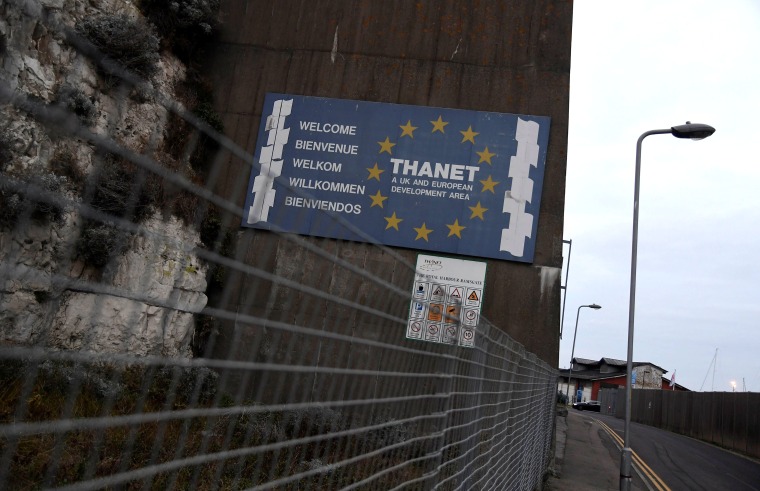RAMSGATE, England — Stuart Piper is enthusiastically awaiting Britain’s looming departure from the European Union.
He is not alone in this corner of England. Nearly 64 percent of people in Thanet, the administrative district that includes the once-thriving port town of Ramsgate, supported leaving in the 2016 referendum.
Since then, both the government and experts have predicted that Brexit will result in the U.K. being worse off.
The Bank of England has warned that a "disorderly" scenario — involving severe delays at U.K. borders and financial markets' loss of confidence in British institutions — could shrink the British economy as much as 8 percent in about a year, with the value of the pound tumbling 25 percent, and house prices falling by 30 percent.
Food and medicine shortages are also possibilities if U.K. ports end up gridlocked due to customs checks being introduced, and the government has said 3,500 troops will be on standby to help deal with disruptions or civil unrest.
Britain will leave the 28-country bloc on March 29 — but with only 74 days to go, lawmakers are bitterly divided about the proposed divorce agreement, meaning a "no-deal" Brexit without any arrangement for future trade is the default option.
The country's finance minister last year also warned that a split without a pact would cost Britain tens of billions of dollars — more than it currently contributes to the E.U.
However, the "no-deal" option would “please” or “delight” around 15 percent of people, according to recent YouGov polls.
Many who support Brexit are anxious for the government to get on with it, no matter the cost.
“There is little doubt that this multicultural experiment has failed miserably,” said Piper, a local politician and former Baptist minister.

Proponents of the U.K.’s departure feel that the E.U. has held Britain back from economic success and that its freedom of movement laws have allowed too many low-skilled migrants into the country.
Around 700 migrants moved to Thanet in 2017, according to local government figures. The district is home to around 140,000 people.
Piper, like many others who support Brexit, isn’t against Europe as a trade partner. His son recently migrated to Poland, and Piper lived for many years in Germany while serving in the army.
He called the predictions of a poorer future outside the E.U. “laughable,” claiming such warnings are nothing more than "project fear" — or scaremongering by elites.
“Leaving the E.U. won’t make life here better, but it won’t make it worse,” said Neil Hopkins, as he fixed a tablet computer at his shop, the IT Service Centre, in Ramsgate.
With cuts to public services and a lack of hospital spaces, he felt Britain “couldn’t carry on importing E.U. nationals. No deal is fine.”
Since late last year, hundreds of migrants have also left France and made the 21-mile journey across the English Channel — one of the world's busiest shipping lanes — in flimsy dinghies and other small vessels. They've landed in Kent, the county where Ramsgate is.
Ramsgate is in some ways similar to the U.S. Rust Belt towns that embraced President Donald Trump.
The city of approximately 50,000 people is home to some of the most deprived areas in England.
It was once a busy port, with vessels shuttling both goods and people to mainland Europe, but that stopped in 2013 when its ferry operator went bankrupt.
With a "no-deal" Brexit looming, Ramsgate has been in the news. At the end of December, the government awarded a $18 million contract to a shipping company to operate ferries from Ramsgate to Ostend, a city on the Belgian coast, in the event of a backlog at the nearby port of Dover.
However, it was later found that the company does not own any ships.

It's the kind of incident that feeds the public’s mistrust in government, according to Steve Coombes, the chairman of the Ramsgate Action Group, a nonpolitical residents’ organization.
Equally, for a town that has seen years of decline, it was hard for residents to see the benefits of remaining an E.U. member.
“The E.U. never bothered to explain to places like Ramsgate what use they are," said Coombes, a TV scriptwriter who voted to remain in the E.U. "If they had done so, things might have been different.”
Britain contributed a net amount of around 350 billion pounds ($446 billion) to the E.U. annually, but the bloc has supported projects in Thanet with tens of millions of dollars in funding.
“Ramsgate feels far from Brussels and equally as far from London,” Coombes added.
After nearly two years of negotiations, Parliament is scheduled to vote Tuesday on the withdrawal agreement negotiated by Prime Minister Theresa May. It is opposed by politicians across the political spectrum — including by many in May's own party.
No one really knows what the future holds if May can't win enough support from fellow lawmakers.
Beverly Martin is a local politician who serves on the Thanet Council with Piper.
A member of May’s Conservative Party, she is unconvinced about the accuracy of the government’s own analysis showing that a "no-deal" Brexit would hurt the U.K. economy.
“I think that businesses are more resilient than we think,” she said.
The only thing these enthusiastic leave supporters hate more than the idea of staying in the E.U. is the withdrawal agreement that the prime minister negotiated.
Echoing the objections of many Brexit-supporting members of Parliament, Piper called May’s deal appalling.
“The cynic in me says they’ve constructed a bad deal to get the public to change their mind,” he said. “It’s either that or they are massively incompetent.”


